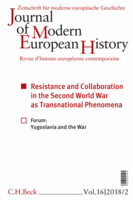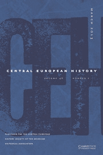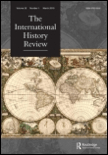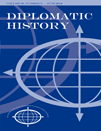
NUOVA RIVISTA STORICA
Scope & Guideline
Advancing Scholarly Discourse in History
Introduction
Aims and Scopes
- Italian and European Political History:
The journal frequently publishes studies on the political dynamics within Italy and its relations with other European nations, particularly during significant historical periods such as the Risorgimento, World Wars, and the Cold War. - Cultural History and Intellectual Movements:
Research on cultural history, exploring the impact of intellectual movements, literature, and the arts in shaping Italian identity and society is a core focus. This includes examinations of cultural diplomacy and the influence of significant cultural figures. - Social History and Minority Studies:
NUOVA RIVISTA STORICA also addresses social history, including the experiences of marginalized groups, such as women, ethnic minorities, and the working class, contributing to a more inclusive understanding of historical narratives. - Diplomatic History and International Relations:
The journal covers diplomatic history extensively, analyzing Italy's foreign policy and its role in international relations, particularly in the context of significant events like the World Wars and the Cold War. - Historiography and Methodological Approaches:
It encourages discussions on historiographical debates and methodological approaches in historical research, promoting a critical analysis of sources and narratives.
Trending and Emerging
- Interdisciplinary Approaches:
There is a growing trend towards interdisciplinary studies that integrate history with fields such as sociology, political science, and cultural studies, allowing for a more nuanced understanding of historical phenomena. - Focus on Gender and Sexuality:
Recent publications indicate an increased emphasis on gender studies and the exploration of sexuality in historical contexts, reflecting broader societal conversations about identity and representation. - Environmental History:
Emerging themes include environmental history, particularly the interactions between human societies and their natural environments, which is becoming increasingly relevant in light of contemporary ecological concerns. - Global History Perspectives:
The journal is expanding its focus to include global historical perspectives, examining Italy's role within a broader international context and its connections to global events and movements. - Digital History and Technological Impact:
There is a rising interest in digital history, exploring how technology influences historical research, dissemination, and the interpretation of historical events.
Declining or Waning
- Medieval Studies:
There has been a noticeable reduction in publications focused on medieval history, particularly studies examining local histories or specific events from this period, suggesting a potential shift towards more modern historical topics. - Colonial and Postcolonial Studies:
Research on Italy's colonial past and its implications appears to be waning, possibly due to the increasing focus on contemporary issues or other historical narratives that are deemed more relevant in current scholarly discourse. - Microhistory:
Although microhistorical approaches were once prominent, there seems to be a declining interest in this method, with fewer papers exploring individual or small-scale events in favor of broader thematic studies.
Similar Journals

Journal of Modern European History
Exploring the Tapestry of Modern European HistoryThe Journal of Modern European History, published by SAGE PUBLICATIONS LTD, is an essential resource for scholars and practitioners in the field of history, particularly focusing on modern European developments. With an ISSN of 1611-8944 and E-ISSN of 2631-9764, this journal boasts a reputation as a Q2 journal in the Arts and Humanities - History category, ranking in the top 25% of its field with a Scopus rank of #404 out of 1760 publications. With its converged years spanning from 2010 to 2024, this journal aims to provide cutting-edge research articles that deepen the understanding of modern European historical events, themes, and methodologies. As a pivotal platform for scholarly discourse, it supports vibrant academic exchange while offering avenues for researchers, professionals, and students to engage with innovative thought in the history domain. For those seeking to expand their knowledge or contribute to the field, the Journal of Modern European History serves as a vital tool for both insight and inspiration.

CENTRAL EUROPEAN HISTORY
Connecting Past and Present in Central European HistoriographyCENTRAL EUROPEAN HISTORY is a distinguished academic journal published by Cambridge University Press, dedicated to the exploration and analysis of historical developments in Central Europe. With its ISSN 0008-9389 and E-ISSN 1569-1616, this journal has been a cornerstone in historical scholarship since its inception in 1968, catering to a global audience through its rigorous research articles and interdisciplinary approach. Recognized in the Q2 category in History in 2023, it aims to bridge gaps in Central European historiography and foster a deeper understanding of the region's complex past. The journal's commitment to publishing high-quality research makes it an invaluable resource for historians, researchers, and students alike. Although it does not offer Open Access, CENTRAL EUROPEAN HISTORY remains a vital publication in the field, addressing themes and debates that resonate with contemporary academic discourses. With a rich archive spanning over five decades, it continues to influence scholarship and promote informed discussions around Central European historical narratives.

ZEITSCHRIFT FUR GESCHICHTSWISSENSCHAFT
Exploring History's Depths, One Article at a Time.ZEITSCHRIFT FUR GESCHICHTSWISSENSCHAFT is a distinguished academic journal published by METROPOL-VERLAG, specializing in the field of History. Established in 1971, this scholarly journal has provided a platform for rigorous research and critical discourse on historical topics, serving a vital role in the advancement of historical methodology and scholarship. The journal holds a current category quartile ranking of Q3 in History for 2023, positioning it within the lower tier of highly regarded journals in its field, as evidenced by its Scopus rank of #1582/1760. Despite being a non-open access publication, the journal is committed to disseminating valuable historical insights and fostering academic exchange among researchers, professionals, and students. With its long-standing reputation and a commitment to high-quality historical research, ZEITSCHRIFT FUR GESCHICHTSWISSENSCHAFT remains an essential resource for those pursuing knowledge and understanding of the past.

INTERNATIONAL HISTORY REVIEW
Fostering Academic Excellence in Historical ResearchINTERNATIONAL HISTORY REVIEW is an esteemed academic journal published by ROUTLEDGE JOURNALS, TAYLOR & FRANCIS LTD, dedicated to advancing the field of historical studies. Established in 1979, this journal has become a significant platform for researchers and scholars striving to explore and interpret historical narratives, methodologies, and debates. With a notable Q2 ranking in both Cultural Studies and History, and a commendable 85th percentile rank in the Arts and Humanities category on Scopus, the journal attracts a diverse readership committed to interdisciplinary dialogue. Although it currently does not offer an Open Access option, the journal is essential for those seeking high-quality research and critical perspectives on history and its related fields. As it converges into 2024, INTERNATIONAL HISTORY REVIEW continues to uphold its mission of fostering scholarly communication and supporting the academic community.

RIVISTA STORICA ITALIANA
Championing Research and Reflection on Italy's PastRIVISTA STORICA ITALIANA, published by EDIZIONI SCIENTIFICHE ITALIANE, is a prestigious journal dedicated to the field of history, particularly focusing on Italian historical studies. Established to promote scholarly dialogue, it serves as a vital resource for researchers, professionals, and students passionate about understanding Italy's rich historical narrative. With a Q4 classification in the 2023 category for History and a ranking of #762 out of 1599 in Scopus, this journal occupies a significant position within the academic landscape. Although it does not currently offer an open access model, the journal maintains a valuable portfolio of articles published continuously from 1973 to 2021, providing insights that contribute to ongoing historical debates. The RIVISTA STORICA ITALIANA is essential for those looking to engage with both traditional and contemporary historical discourses, and it remains a cornerstone for historical scholarship in Italy.

Annali dell Istituto storico italo-germanico in Trento
Unveiling the Tapestry of Italian-German HistoryAnnali dell'Istituto storico italo-germanico in Trento is a distinguished academic journal published by SOC ED IL MULINO, dedicated to the exploration and dissemination of research in the field of history, with a particular focus on Italian-German historical relations. With an ISSN of 0392-0011 and an E-ISSN of 2612-2251, this journal serves as a valuable resource for historians, researchers, and students, contributing to the academic discourse in history, particularly during the converged years from 2020 to 2024. Despite its current Q4 ranking in the Arts and Humanities History category, the journal offers a platform for emerging voices and innovative scholarship, embracing a diverse range of topics within historical studies. The impact factor is still under establishment, yet its positioning at rank #1155 out of 1760 in the Scopus database highlights its relevance within the competitive landscape of historical research. As a non-open access publication, it maintains high academic standards while ensuring that the richness of its contributions is accessible to a dedicated readership. Researchers are encouraged to submit their manuscripts to further enrich the journal's profile and foster a deeper understanding of historical narratives between Italy and Germany.

TIJDSCHRIFT VOOR GESCHIEDENIS
Unveiling the Past, Shaping the FutureTIJDSCHRIFT VOOR GESCHIEDENIS is a prestigious academic journal published by WOLTERS-NOORDHOFF B V, dedicated to the field of history. With its ISSN 0040-7518 and an established reputation in the Netherlands, this journal serves as a vital platform for researchers, professionals, and students to disseminate and engage with significant historical scholarship. The journal's impactful contributions have earned it a commendable Q2 category ranking in the history field for 2023, placing it in the top tier of history journals according to Scopus. Although not open access, TIJDSCHRIFT VOOR GESCHIEDENIS offers invaluable insights into various historical topics spanning from its converged years starting in 1983 through to 2024. This enduring commitment to scholarly excellence fosters robust academic discourse and acts as an essential resource for those engaged in historical studies.

DIPLOMATIC HISTORY
Illuminating the Past to Understand the PresentDIPLOMATIC HISTORY, published by OXFORD UNIV PRESS, is a leading academic journal in the field of diplomatic studies, boasting an impressive Q2 ranking in History and a notable 84th percentile among the top arts and humanities journals as per Scopus rankings. Since its inception in 1977, this esteemed journal has consistently provided a scholarly platform for rigorous research and innovative discussions surrounding the dynamics of international relations, statecraft, and political diplomacy. With contributions from esteemed historians and emerging scholars alike, DIPLOMATIC HISTORY endeavors to examine historical contexts that shape contemporary diplomatic practices, fostering a deep understanding of past and present geopolitical landscapes. While this journal does not currently offer Open Access, it remains a vital resource for researchers and professionals striving to enhance their expertise in the complex interplay of history and diplomacy.

Istorija
Bridging Regional and Global Historical PerspectivesIstorija is a distinguished academic journal published by Vytautas Magnus University Education Academy, focusing on historical research and discourse. With its ISSN 1392-0456 and E-ISSN 2029-7181, the journal aims to disseminate high-quality scholarly articles that explore various facets of history, catering to an audience of researchers, educators, and students alike. Although currently not open access, Istorija remains committed to advancing historical scholarship by contributing valuable insights and fostering academic dialogue through an inclusive editorial process. Set against the backdrop of Vilnius, Lithuania, the journal engages with both regional and international historical narratives, making it a pivotal resource for those looking to deepen their understanding of historical events, methodologies, and interpretations. Whether you are a seasoned historian or a burgeoning scholar, Istorija offers a platform for the exploration and exchange of innovative ideas and research within the discipline.

REVUE DU NORD
Connecting Scholars, Cultivating KnowledgeREVUE DU NORD is a scholarly journal published by UNIV CHARLES DE GAULLE - LILLE III, focusing on the fields of Archaeology and History. Since its inception in 1969, this French journal has played a crucial role in disseminating research and scholarly discussions pertaining to northern France and its cultural heritage. Although it is currently categorized in Q4 across its respective fields, it serves as a valuable resource for both emerging scholars and established researchers looking to explore new perspectives within these disciplines. The journal features a diverse range of articles that contribute to the understanding of historical events and archaeological findings, making it accessible to a wider academic audience. While it does not offer an open access model, readers can access its compelling content through institutional subscriptions, ensuring that the richness of its scholarship remains available to those interested in the evolution of history and archaeology. With an ongoing commitment to fostering academic dialogue, REVUE DU NORD remains an important platform within the arts and humanities landscape.